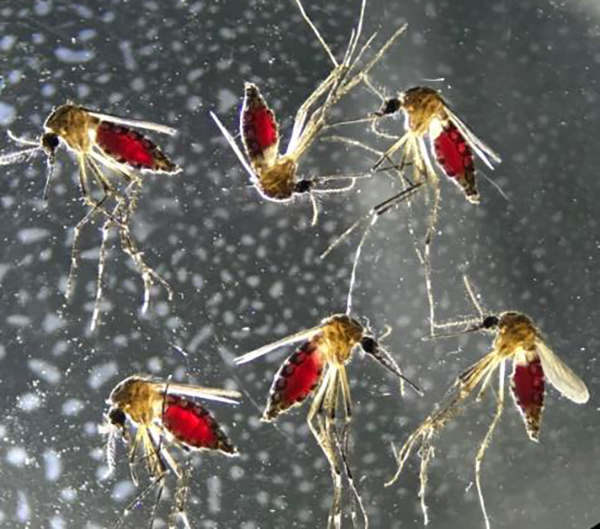When mosquitoes take a blood meal, they deposit saliva into their host’s skin, provoking an immune response even in the absence of pathogens. The saliva alone, because of the proteins it contains, causes cytokine levels in the blood to rise, while altering the size of immune cell subpopulations. Such changes have been observed in studies with mouse models, but a new study goes a bit further. It describes the effects of mosquito bites on human immune cells in mice engrafted with human hematopoietic stem cells.
The new study, from scientists based at Baylor College of Medicine, shows that the number of immune cell types affected is much larger than previously described, and that some immune responses to mosquito bites can be detected up until seven days post-bite.
Although these findings are of uncertain biological significance, they could complement findings from earlier studies that mosquito saliva enhances the pathogenicity of dengue, West Nile, and other arbovirus infections. Also, one of the new findings, that immune effects instigated by mosquito bites are so long lasting, could be relevant to the study of allergic reactions.
Details of the new study appeared May 17 in the journal PLOS Neglected Tropical Diseases, in an article entitled “Mosquito Saliva Alone Has Profound Effects on the Human Immune System.” This article describes how the Baylor team, led by virologist and microbiologist Rebecca Rico-Hesse, Ph.D., used flow cytometry and multiplex cytokine bead array assays, with detailed statistical analyses, to detect small but significant variations in immune cell functions after four mosquitoes fed on humanized mice footpads.
“We detected both Th1 and Th2 human immune responses, and delayed effects on cytokine levels in the blood, and immune cell compositions in the skin and bone marrow, up to 7 days post-bites,” the article’s authors wrote. “These are the first measurements of this kind, with human immune responses in whole animals, bitten by living mosquitoes, versus previous studies using incomplete mouse models and salivary gland extracts or needle injected saliva.”
At various points during the immune responses, there were also increases to levels of natural killer T cells, natural killer cells, CD8+ T cells, mononocytes, and macrophages. Overall, evidence of the immune responses lasted up to 7 days post-bite and were seen in multiple tissue types, including the blood, skin, and bone marrow.
“These results have major implications for the study of hematophagous insect saliva, its effects on the human immune system, with or without pathogen transmission, and the possibility of determining which of these proteins to target for vaccination, in attempts to block transmission of numerous tropical diseases,” the authors of the study concluded. “The long-lasting effects in the humanized bone marrow and skin cells could explain how some of the viruses transmitted by mosquitoes could possibly still be viable in these tissues, or how they could serve as replication reservoirs.”



